- Home
- Claire Legrand
Cavendish Home for Boys and Girls Page 2
Cavendish Home for Boys and Girls Read online
Page 2
However, today was not a reasonable day; Victoria had an academic report sitting at home with a B on it, for goodness’ sake. There was no time to listen to Lawrence whine and sigh about how he wished his parents understood him and his stupid music better. Victoria slammed open the piano and rummaged through Lawrence’s untidy stacks of music.
“Where’s the Fauré?” she snapped. “Let’s play it.”
Lawrence blinked. “The Fauré?”
“Yes, the duet. We’ve got an exam on it next week, don’t we?”
Lawrence sat on the piano bench beside Victoria, looking around from beneath his hair. The house was much darker than usual. The air sat strangely quiet and heavy around their shoulders.
“I don’t know if that’s such a good idea,” he said.
“Well, I don’t care.” Victoria put her fingers on the keys and glared at him. “Come on, play.”
“What’s the matter with you, anyway?”
Victoria didn’t answer. She started playing the bottom part of the duet. Her anger made the notes choppy and clumsy, but she kept going, her cheeks flaming. All she could think of was that awful B mocking her.
Lawrence joined in after a few measures, and even in the dark house and despite Victoria’s fury, once Lawrence began to play, everything seemed better. His fingers flew across the keys, delicate and confident. Music came to him as easily as order and structure came to Victoria. Lawrence’s eyes glazed, and he got that tiny secret smile that he always got when playing. When they ended the duet with four bouncing chords, Victoria sat in angry silence. She glared at the piano.
“I got a B,” she said.
“I figured.”
“Oh, don’t act like you know me so well.”
Lawrence grinned. “Can’t help it. That’s what happens when you’ve got only one friend.”
“You’re lucky you have even that,” Victoria said.
“You aren’t bad at piano, you know. You just need to relax.”
Victoria scoffed. “People who relax don’t get anything done.”
“Oh, that’s right. For a second, I forgot who I was talking to.”
“Make fun of me all you want, but don’t come crying to me when you’re working in a dump someday, all smelly and rumpled with only your lousy music to keep you company, when I’m at some big, fancy office somewhere, making lots of money and . . . and . . .”
Victoria stopped. Lawrence watched her from beneath his hair, the silver strands bright in the light of the piano lamp. He looked pathetic and hopeless. Victoria’s stomach sank with shame, but she tightened her mouth and refused to look away.
“That’s really what you think of me, huh?” said Lawrence.
“It’s not like I ever made a secret of it,” said Victoria, wincing inside even as the words popped out. It wasn’t what a friend was supposed to say. She couldn’t help saying it, though; her anger was too great. I have a B, for goodness’ sake, she thought. And anyway, Lawrence could use a harsh word or two, to snap him out of his piano world and into the real one.
Lawrence frowned and closed the piano. “Let’s just go to school.”
As they passed through the foyer, Lawrence grabbed his tattered book bag from the floor by the door. He kept tripping over himself as he pulled on his shoes. Victoria watched, her nose wrinkling.
“What in the world’s wrong with you?” she said.
“Nothing,” said Lawrence, but Victoria noticed for the first time that his normally sleepy gray eyes seemed a bit funny, like a rabbit’s eyes—scared and stupid.
Upstairs, someone stalked across the floor, toward the stairs. Victoria jumped at the sudden noise. Lawrence flinched.
“Let’s get out of here,” he said quickly.
Victoria stared at him. “Shouldn’t we wait to say good-bye to your parents? It sounds like they’re coming right down.”
“No. Let’s go.”
When they reached the front gate, Victoria sniffed and said, “Look, I’m sorry about what I said before. I didn’t mean it. Your music isn’t lousy.” She hated apologizing, especially when she knew she was right in the first place. All right, so his music wasn’t lousy; anyone could tell that much. But if Lawrence didn’t start trying harder at school, he would go on probation, or he might be dismissed, and then he would have to attend one of the public schools outside Belleville, and that would ruin him forever. What good would music do him then? It wasn’t practical; it wasn’t profitable.
Victoria opened her mouth to tell Lawrence all these things in the hopes that he might actually listen to her this time, but before she could, Lawrence grabbed her hand and tugged her through the gate.
“What’re you—?”
“Hurry, Vicky,” he said, looking back over his shoulder again.
“You act like you’re scared or something,” said Victoria, shaking him off.
But then she looked back over her shoulder too and saw Mr. and Mrs. Prewitt watching silently from the front door. She was too far away to see their eyes, and their faces were only blurred, white disks, but for some reason, the sight of them chilled her.
“Don’t look at them,” said Lawrence. “They’re . . . not feeling well. They’re acting so weird lately.”
“What does that matter? You’re being ridiculous.”
“I heard them talking about me, after supper one night. They didn’t know I was listening, but they were talking about my music, and . . . I don’t know. Maybe I heard wrong. They didn’t sound like themselves, if that makes sense.”
“It doesn’t.”
“Well, it’s true.”
Victoria sighed. “So, they were talking about your music, and . . . what?” But Lawrence shook his hair into his face and only said “Never mind. I don’t want to talk about it anymore.”
As they hurried on to school, between clipped hedges and towering black gates, Victoria kept looking behind them, but she saw nothing out of the ordinary except a big black bug on the walk, waving its feelers in the air. Even so, she couldn’t shake the feeling of being followed.
A CLUSTER OF ANGRY RED BUILDINGS SAT HIGH ON a hill on the western edge of Belleville, overlooking the entire town—Impetus Academy: Where Tradition Meets Innovation.
Victoria and Lawrence approached the Academy up the familiar cobblestone streets, which were lined with iron-framed black signs saying things like INSPIRATION. Upon the Academy’s construction, the town planners renamed the surrounding roads with appropriately educational words: INTEGRITY. CURIOSITY. MOTIVATION.
Victoria’s chest pricked with satisfaction upon seeing those signs. DISCOVERY. KNOWLEDGE.
VICTORY.
That one was Victoria’s favorite. It was as though her parents had always known she would be a winner. Her very name spoke of trophies, medals, and honor rolls. She thought of that ridiculous B and imagined it was that ugly bug she’d seen earlier on the walk. Then she imagined stepping on that bug, feelers and all, pop and crunch, its unacceptably mediocre guts splattering beneath her shoe.
The image helped. Victoria thinned her lips against the strange memory of Mr. and Mrs. Prewitt at the door of Lawrence’s house, and what Lawrence had said afterward. They’d been talking about his music, he said. That didn’t seem so awful—unless the Prewitts had finally grown tired of Lawrence doing nothing but pounding away at the piano. She couldn’t blame them for being angry, if that was the case; together, Lawrence and his music could drive anyone out of her mind.
Victoria glared over at him. Other students were joining them from the surrounding neighborhoods. “Tuck in your shirt,” she hissed at him. “For heaven’s sake.”
Lawrence shivered as they passed beneath a tree. “No,” he said, and when Victoria opened her mouth to say more, he cut her off. “Don’t, Vicky. Not today.”
Victoria paused at that. Lawrence shoved his hands into his pockets, his lanky shoulders so hunched they almost brushed his ears. He kept glancing around them from beneath his hair. When another student bumped into them
, Lawrence jerked back like someone had smacked him.
Victoria looked closer, narrowing her eyes into that awful, cutting look that Lawrence called her demon dazzle because it both terrified and paralyzed its victims. Lawrence hadn’t ever been truly scared of it, but he often humored her by staggering back, collapsing, and gasping for mercy. Victoria secretly found this incredibly amusing and gratifying but never told him so.
But Lawrence didn’t do anything like that this time. In fact, he hardly seemed to notice the dazzle. He ducked farther down between his shoulders and squeezed his book bag till his knuckles turned white.
The whole effect left Lawrence looking rather like a terrified skunk. But as odd as this was, Victoria was in no mood to pity him. He and his music and his understandably frustrated parents were not her problems. Her B burrowed into her brain till she could see nothing else.
“You’re hopeless, Lawrence Prewitt,” she snapped, and stalked away.
At the circle drive in front of the Academy’s entrance, silver cars lined up one after another. All the doors opened at once, and all the satellite radios were silenced with a voice command from their drivers. All the children stepped out of their cars and onto the curb. All their parents waved good-bye and said, “Have a good day, Madison,” or Brooks, Avery, Harper, and on and on.
The cars zipped away in silent, orderly lines, over and over, circling through the Academy drive like busy metal creatures until more took their place. As Victoria passed their open doors, she heard the parents chatting and chirping about fancy soaps and organic tomatoes, diets and weight-loss something-or-others, salons and massages, the maid and the nanny. Their children filed into the Academy between mighty pillars. Then the next set of shining cars glided into place in a triumphant mechanical ballet till the first bell rang at seven forty-five.
Victoria marched straight into Building One, Room Seven, for Round Table. For half an hour each day before first period, everyone in her year gathered to discuss current events and Academy business. But what really happened, to Victoria’s disgust, was that the professors on Round Table rotation gossiped over yogurt, and the students played stupid truth-or-dare games, kissed their girlfriends and boyfriends, and snuck over to Room Eight, where the older kids were. Victoria caught bits of conversation from here and there, about who was going out with whom, the dress Bailey Hightower had bought for the fall dance, and lip gloss.
Victoria turned up her nose in disgust at them all. Doesn’t anyone talk about anything important? she wondered.
“Oh, look. The Skunk’s in top form today,” Victoria heard someone whisper as she took her seat. She turned and saw Lawrence scurry in. He didn’t join her at the front table, where they usually sat alone—Victoria ready with her notebook open just in case one of the professors got ambitious, Lawrence scribbling in his composition notebook or doing something equally pointless.
Instead, Lawrence darted into one of the back corners and sat down as close to the wall as possible. He clutched his bag to his stomach and stared at the floor, his face set in grim lines.
Victoria frowned—at first because she wanted to slap Lawrence upside his head, and then because something cold slithered through Room Seven like a slow breeze. Victoria crossed her arms and shivered, but no one else around her seemed to notice.
The older, senior professors standing around the room stopped talking to watch Lawrence. Their eyes flickered over to him, and their posture sharpened. Some of their eyes flashed, and some of them seemed frightened for some reason, and some of their faces twitched with tiny, sharp smiles. The smiles and twitches passed from one to the next and the next.
They seemed like wolves eyeing Lawrence as a possible snack.
Then the cold vanished. Maybe it was only a little chill from outside, Victoria thought.
The professors started talking again. Their eyes stopped flashing, and they looked normal once more.
“I think the Skunk’s finally losing it,” someone whispered, and Victoria turned to see Jill Hennessey leaning toward the others at her table. She stared right at Victoria, smirking.
“What do you think, Vicky?” Jill said, louder. She batted her eyelashes and flashed her perfect teeth. Some of the girls around her laughed. “You’d know, wouldn’t you? You two being so . . . close.”
Victoria hated a lot of things about the world. She hated when Beatrice didn’t iron the pleats in her skirt right. She hated Mr. Tibbalt and his evil red lapdog, both of whom lacked any sort of personal hygiene and unfortunately lived just down Victoria’s street. She hated things that didn’t make sense.
She hated the B on her academic report.
She even hated Lawrence a little bit right now, what with how strangely he was acting.
But she hated none of that more than she hated Jill Hennessey, her nemesis, the one person in all the seventh-year students who cared about school as much as Victoria did. Jill, who fought with Victoria to be the first to answer questions, to write the longest papers, to be top of the class.
Jill, who could never, ever know about Victoria’s B.
Victoria stared at Jill and her frozen smile. Jill tossed her shining red hair and let it slide around her neck. Immediately, her friends all did the exact same thing.
“I don’t know what you’re talking about,” said Victoria. She tossed her curls, which were the best in their year because she had made sure of it. It was part of the plan—perfection, achievement, the top, the best. Victoria’s face burned with pride and hardened into a fierce dazzle.
The other girls blinked, but not Jill. She kept staring at Victoria, her eyes sharp like all those professors glaring at Lawrence, and Victoria felt a tiny bit sorry, but she just couldn’t keep it in: “I don’t care anything about the Skunk,” Victoria said. The words came out without her permission and twisted her chest uncomfortably, but she shoved the feeling away. This was not the time to feel sorry for anyone.
Jill laughed. “What’s it like, Vicky? Being a Skunk’s girlfriend, I mean?”
Victoria tried to stop herself from blushing, but it happened anyway. Girlfriend? Her mouth dried up, and she suddenly had no idea what to do with her hands. They would not stop fidgeting. Lawrence’s smiling face popped into her head, and she scowled. “I’m no one’s girlfriend,” she snapped.
“He’s always creeping around like a bug,” said Tate Gardiner. “Like a—like a skunk.” Obviously, Tate thought herself very clever.
Victoria gave her a withering look. “Brilliant. No one’s ever come up with that before.” Turning away to her notebook, she began copying out -er verbs for that afternoon’s French quiz. She tried to push all thoughts of Lawrence and girlfriends and stupid Jill Hennessey out of her head.
Manger. To eat.
But it was no good. Victoria heard them still whispering. She felt Lawrence sitting in the corner of the room and felt a little bad for calling him the Skunk, but, well, there was such a thing as hair dye, after all. His face popped into her head, this time looking sad and pathetic. She ignored it and kept working.
Je mange. I eat. Tu manges. You eat. Il mange. He eats.
Behind Victoria, Jill cleared her throat.
Victoria frowned and pressed her pencil harder.
Nous mangeons. We eat.
The words left indentations in the paper. The graphite tip snapped off Victoria’s pencil.
“Oh, by the way, Victoria,” said Jill, her voice smiling.
Victoria didn’t even have to turn around. She knew what was coming. She heard it in Jill’s tone. Bile churned in Victoria’s stomach and throat. A sick feeling raced down her arms. She got goosebumps and tried to will them smooth. Her heart had never pounded with such anger and fear.
“I heard,” Jill said, leaning forward, “that you got a B.”
The others gasped. Some of them laughed. Tate blurted, “Ha!” The sound echoed, and others turned.
Victoria turned too. She kept her face cold and raised an eyebrow.
“You got a
B,” Jill repeated, grinning. “In music class.”
“I don’t know what you’re talking about,” said Victoria.
“Yes, you do. On your academic report.”
Lots of people were watching now. Inside, Victoria raged. Outside, Victoria rolled her eyes.
“Oh, I’m sure,” she said.
“I’m sure,” said Jill. “I saw it in Professor Carroll’s gradebook. Victoria Wright, B. I got an A minus.” Jill widened her eyes and whispered, “You know what that means, of course?”
Oh, Victoria knew what that meant, and it made her ill. She couldn’t contain her mortification any longer. A flush crept up her cheeks. Tate hid her mouth and giggled.
“It means,” Jill said slowly, relishing her triumph, “that now I’m top of the class.”
Victoria’s world heaved. Her mind rebelled against the very idea. Top of the class was hers and always had been. She owned it. She had fought from infancy for it. It was her blood, it was her soul, and everyone knew it. Victoria had never made a secret of her ambition. It was her identity: Victoria, the best.
Jill, the second best.
Lawrence, the Skunk.
Jill looked ready to burst out laughing.
“Oh, poor little ice queen, turning all pink,” Tate said, giggling.
Victoria grabbed for the only weapon she could find; it popped out from her mind in a rush of fury. That Jill dared gloat like this, in front of everyone, and make Victoria look stupid, when in fact she was the exact opposite of stupid, enraged her. That Professor Carroll had dared give Victoria a B enraged her. That Lawrence had dared to be born with the kind of musical talent that would earn him an A while Victoria was given a B enraged her.
Anger rushed from her head to her arms and the tips of her toes, until Victoria could feel and see and think about nothing else. She glared at Jill and said, through clenched teeth, “And where’s your sister Jacqueline today, Jill?”
Jacqueline, the freak.
It was a sloppy move, to bring up Jacqueline, but Victoria needed time to gather herself. Normally she enjoyed arguing with Jill, because she liked making Jill look stupid. But now that people knew about the B, Victoria had no more wit. So instead she used Jacqueline, Jill’s ugly, strange, hated twin sister and the shame of the Hennessey family, as a distraction. Jacqueline, who talked to herself, who drew on her arms in class, who scribbled gruesome drawings in her notebooks. Jacqueline, who had splotchy, bumpy skin and hunched over when she walked and hid behind her tangled hair.

 Furyborn
Furyborn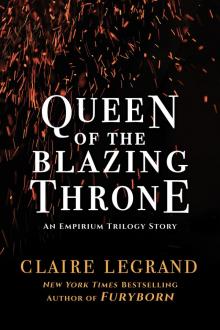 Queen of the Blazing Throne
Queen of the Blazing Throne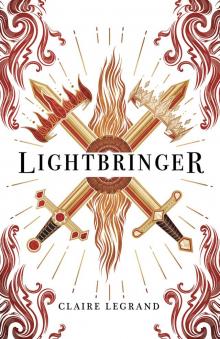 Lightbringer
Lightbringer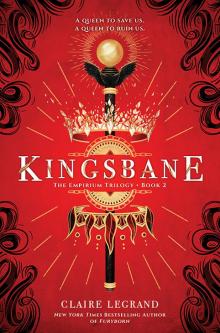 Kingsbane
Kingsbane Cavendish Home for Boys and Girls
Cavendish Home for Boys and Girls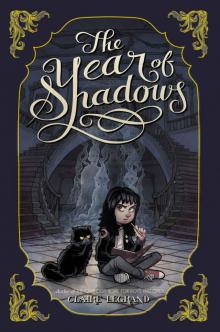 The Year of Shadows
The Year of Shadows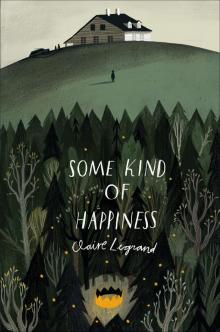 Some Kind of Happiness
Some Kind of Happiness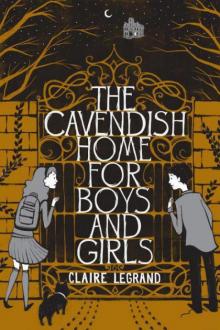 The Cavendish Home for Boys and Girls
The Cavendish Home for Boys and Girls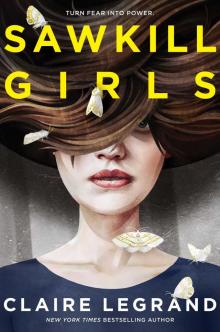 Sawkill Girls
Sawkill Girls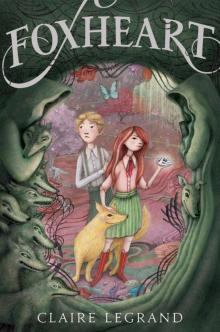 Foxheart
Foxheart Summerfall: A Winterspell Novella
Summerfall: A Winterspell Novella